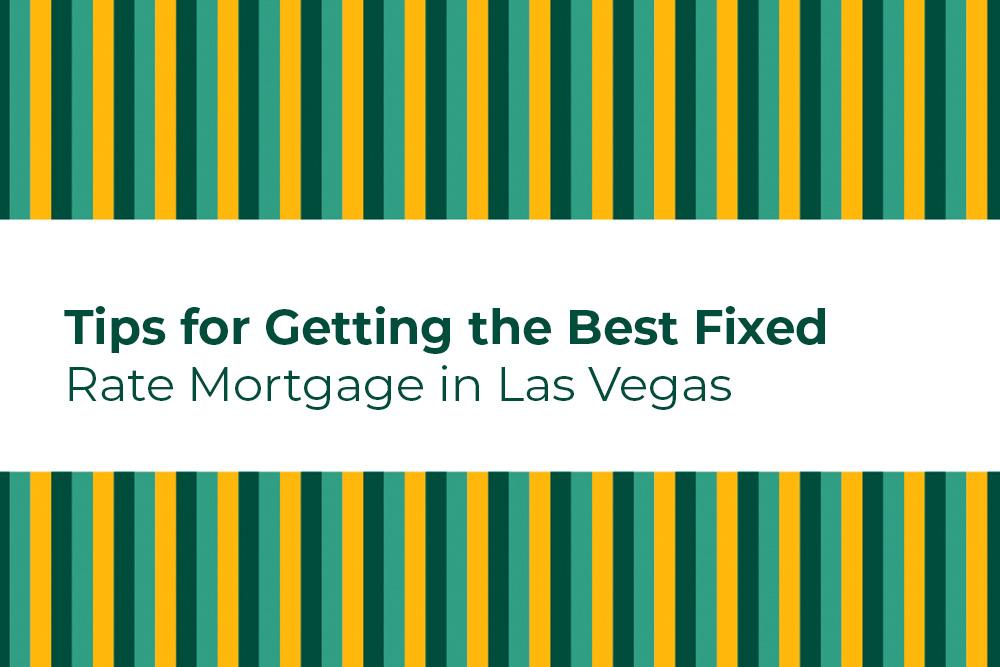
Mortgages fall into two categories, which are fixed-rate and adjustable. Both are options for mortgages in Las Vegas, but many homeowners choose fixed-rate mortgages for their predictable rates. Since you’ll likely be paying off your mortgage over the next 15 to 30 years, it’s important to lock in a reasonable rate from the start.
Determining a Maximum Loan Amount

Mortgage brokers in Las Vegas use several criteria to determine how much mortgage you qualify for, called ratios. When you meet with a lender to discuss loan options, you’ll likely hear the terms “front-end ratio” and “back-end ratio.”
The front-end ratio is the amount of your income that will go towards paying off your mortgage. Most homeowners can comfortably afford to buy a home that costs two or two and a half times their annual salary. For instance, a homeowner who earns $80,000 per year can generally qualify for a loan of up to $200,000. Although it’s usually possible to pay for a home that costs twice as much as you earn every year, mortgage brokers in Las Vegas recommend getting a mortgage of no more than 28% of your annual salary. When it comes to mortgages, it’s best to err on the side of caution and get a smaller mortgage that you can confidently pay for each month than struggle to pay off your loan.
The back-end ratio also determines the size of the Fairway mortgage in Las Vegas that you qualify for. This ratio considers all the other expenses that you pay each month, such as rent, student loans, and car payments. A lender will add all the other monthly expenses that you have up to determine if you can realistically take on the added cost of homeownership.
Collectively, these miscellaneous expenses are called your debt-to-income ratio, and they should amount to no more than 36% of your gross income. Even before contacting a mortgage lender, you can figure out your debt-to-income ratio by multiplying your gross income by 0.36 and then dividing that number by 12. Note that local housing prices can also influence the debt-to-income ratio.
If you’re looking for a home that costs more money or that’s in a neighborhood with higher home prices, lenders may raise the debt-to-income limit to 45% of your income. Although you may qualify for a loan with a higher debt-to-income ceiling, you can end up with higher mortgage rates in Las Vegas to compensate. Since you will get better interest rates with a lower debt-to-income ratio, try to pay off as much of your other debts as you can before taking out a loan. While you might be nervous about spending money on paying off debts right before you buy a home, you may ultimately save money by lowering your monthly loan payments.
Timing is Everything

Each month, chances are good that you have at least one credit card bill to pay. It might not seem like a big deal to skip a monthly payment, but delaying your monthly payments can hurt your chances of getting competitive mortgage rates in Las Vegas. Skipping just one monthly payment can negatively affect your credit rating, which is a detriment when you start the process of applying for a loan. Even if you can’t pay the entire bill in a given month, making at least a partial payment on time shows a lender that you’re responsible for your finances. It will also improve your chances of paying lower interest rates on your mortgages in Las Vegas.
What if I have a low credit score?
Your credit score is a major factor in determining the loan that you qualify for. A higher credit score also means you’ll get more competitive rates on your loan. Even if your credit score is lower than what lenders like to see, you will have time to improve it if you start the mortgage process early. Even if you’re not yet ready to buy a home, professionals recommend considering mortgage requirements at least five years in advance. That gives you time to improve your credit score if necessary and pay off lingering debts.
Think About the Down Payment
For standard mortgages in Las Vegas, you should plan for a minimum 20% down payment to secure your new home. However, there may be situations where you qualify for a lower down payment. For instance, lower down payments are available for military veterans and some people who buy property in rural areas. Depending on your personal circumstance, you may qualify for a smaller down payment of 3% to 3.5% or even get a loan that requires no down payment at all.
Loans with smaller down payment requirements include:
- VA loans
- USDA loans
- FHA loans
- Some conventional loans
Veterans Affairs (VA) loans are administered by the Department of Veterans Affairs. They are available to prospective homeowners or their spouses who are active military members or veterans.
The US Department of Agriculture (USDA) offers USDA loans for people buying homes in rural areas. To facilitate homeownership, the USDA may offer a mortgage that requires a small down payment or even no down payment at all. The USDA may help cover the home’s closing costs, too.
Federal Housing Administration (FHA) loans are another option for homeowners looking for a lower down payment. With an FHA loan, you can get a down payment rate as low as 3.5%. FHA loans are also more realistic for people with lower credit scores. However, if you get an FHA loan, you can expect to pay an additional monthly cost called mortgage insurance every month. Mortgage insurance gives lenders security in case the borrower defaults and it is commonly applied to loans with a smaller down payment requirement.
Some conventional loans are also offered with a down payment option of less than 20%. Unlike other low-payment loans, conventional loans are backed by private lenders rather than the federal government. Like FHA loans, you will need to make additional mortgage payments every month if you take out a conventional loan with a 3% down payment requirement.
Compare Loan Offers

Before settling on a loan, comparing rates from different mortgage brokers in Las Vegas is a good idea. Lenders vary in prices and requirements, so shopping around for loans is a great way to ensure you get the best terms and rates. Be aware that there is usually a time limit of 15-45 days to shop for a loan and submit applications. During that time, you can apply for as many mortgages in Las Vegas as you want, but if you continue to apply for loans after 45 days, your credit score may take a hit as a result. It’s also wise to look at different lender types, including credit unions, banks, online lenders, and federal agencies, if you qualify for a government-backed loan. You will also want to compare each lender’s closing costs. All mortgage brokers in Las Vegas must provide you with a loan estimate detailing their terms and fees.
If you want to know “where is a mortgage lender near me who can help out,” contact us today! We can tell you all about the mortgages in Las Vegas that you may qualify for.









